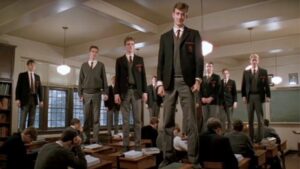Loss of the Values:
Freedom of Choice in Dead Poets Society
By İlayda Yılmaz and Gülçin Dayi

Dead Poets Society, written by Nancy H. Kleinbaum in 1989, depicts the value of freedom in all aspects of life and how it affects the lives of a group of teenagers. Neil, who has spent his entire life following his father’s wishes, discovers a new passion in the theater and expresses his desire to perform; however, his father hinders Neil from choosing acting as an occupation by imposing his own desired profession on Neil. Neil’s father does not only take away his right to choose, but he also attempts to oppress Neil by forcing him to send to the military, which leads him to realize that if he lives, he will be subjected to his father’s rules. Thinking that he has no freedom over his own life, Neil commits suicide due to his parent’s unfair treatment of not allowing him to perform. If Neil had the option to choose, he would pursue his passion for theatre and would still be alive. In the novel, taking away an individual’s freedom and choice to choose their profession is almost equated to taking their life, as a lifespan without freedom tends to become a prison for an individual. Thus, Neil’s suicide conveys the importance of the freedom of an individual and also teaches people that their children’s lives and wishes are more important than what their parents want them to be.
The novel also handles the restriction on the right to pursue good education considering that the boys never study anything that will broaden their horizons; instead, they solely study issues relating to science. The boys’ teaching method worries the English teacher, Mr. Keating, as he believes that they are not receiving the appropriate education. Mr. Keating chooses unconventional and creative teaching methods, which bothers others including teachers and the principal, and encourages students to strive to find their own voice, resulting in his expulsion from the school.
Students reside in a close community where their way of life is similar to that of a cult. The school’s minister limits their freedom in the name of education: students are not allowed to chat with girls or interact with anyone they like. As a teacher, the headmaster believes that spanking students with a stick are the best way to punish and discipline them. Resorting to physical violence merely because students expressed a suggestion that contradicts their principles is also a way to silence and oppress students, expecting them to submit to the system enslaving them. This infringement of their rights, putting students in an unhealthy environment, highlights how crucial it is not to restrict anyone, especially a group of teenagers, who are just beginning to explore the world. The novel clearly illustrates the dire consequences of not respecting the values of freedom of expression, freedom to choose an occupation, and prohibition of degrading treatment or punishment.

